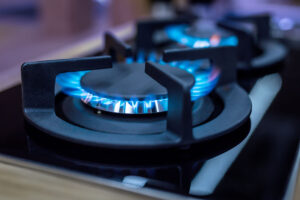
If you smell gas in your home, you might have a gas leak. Take immediate action to protect yourself and your loved ones.
Natural gas is an essential resource in many homes, providing energy for cooking, heating, and hot water. While generally safe when used properly, a gas leak can pose serious risks, including fires, explosions, and health hazards. Knowing what to do if you smell gas in your home can protect you, your loved ones, and your property.
Recognizing the Smell of Gas
Natural gas is odorless, so gas companies add a chemical called mercaptan to give it a distinctive “rotten egg” smell. This strong odor is your first alert to a possible gas leak. It’s crucial to act quickly at the first whiff of this smell to prevent dangerous situations.
Step-by-Step Actions to Take If You Smell Gas
- Don’t Ignore the Smell
If you notice the odor of gas, trust your senses. The smell of gas should never be dismissed or considered normal. Even a faint smell of gas could indicate a leak. Take action immediately. - Do Not Use Electrical Devices
Do not turn on or off any electrical appliances or light switches, and do not use your phone in the affected area. Electrical sparks could ignite the gas and cause an explosion. This includes avoiding the use of garage door openers or any device that could create a spark. - Open Windows and Doors
If possible, open all windows and doors to ventilate your home. Fresh air can help disperse the gas, reducing the concentration and minimizing the risk of an explosion. However, do this only if it is safe and does not require you to operate any switches or devices. - Evacuate Immediately
Once you’ve recognized the smell of gas, evacuate your home right away. Make sure everyone in your household, including pets, leaves the building. Do not waste time gathering belongings; safety is your top priority. - Avoid Flames or Sparks
Do not use matches, lighters, or any open flames. Avoid smoking or doing anything that might create a spark. Gas is highly flammable, and even the smallest ignition source could cause a significant fire or explosion. - Do Not Start Your Vehicle
If the gas smell is near your garage or where your vehicle is parked, do not start your car. A running engine could ignite the gas, leading to an explosion. Walk to a safe distance instead. - Call Your Gas Company or Emergency Services
Once you are safely away from your home, call your local gas company or emergency services. Report the smell of gas, and follow their instructions. They will have trained professionals who can come to your location, shut off the gas, and identify the source of the leak. - Do Not Re-Enter Your Home
Do not go back into your home until it has been declared safe by the gas company or emergency responders. Even if you no longer smell gas, there may still be dangerous levels present.
Understanding the Causes of Gas Leaks
While gas leaks are relatively rare, understanding their causes can help you take preventative measures:
- Faulty Appliances: Appliances that use gas, such as stoves, furnaces, or water heaters, can develop leaks over time, especially if they are old or not maintained properly.
- Damaged Gas Lines: Gas lines can be damaged by digging or construction work, severe weather, or natural wear and tear. Ensure that any work near your gas line is done with care and that you are aware of the location of your gas line.
- Improper Installation: If appliances are not installed correctly or gas lines are not properly sealed, leaks can occur. Always use qualified professionals for installations and repairs.
Preventing Gas Leaks
To minimize the risk of a gas leak in your home, consider these preventive measures:
- Regular Inspections: Schedule regular inspections of your gas appliances and lines by a licensed professional. Regular checks can help identify potential issues before they become serious problems.
- Install a Gas Detector: Gas detectors provide an added layer of safety by alerting you to the presence of gas, even if you don’t smell it. Place detectors near gas appliances and in key areas such as basements or utility rooms.
- Maintain Good Ventilation: Ensure that your home is well-ventilated, especially areas with gas appliances. Adequate ventilation helps disperse any gas that might leak and prevents dangerous build-up.
- Educate Your Household: Make sure everyone in your household knows the signs of a gas leak and what to do if they smell gas. Practice emergency evacuation plans and ensure everyone understands the importance of leaving the building immediately.
Health Risks of Gas Leaks
Aside from the risk of fire or explosion, gas leaks can pose health risks. Prolonged exposure to natural gas can cause symptoms such as headaches, dizziness, nausea, and fatigue. In severe cases, it can lead to carbon monoxide poisoning, which is potentially fatal. If you experience any of these symptoms and suspect a gas leak, evacuate immediately and seek medical attention.
Call Mahon Plumbing Today
If you still have more questions regarding your plumbing, we here at Mahon Plumbing are here to help. We have been serving the wider Baltimore area since 1994, so we have 25 years of experience to back up our fantastic service! Call us at our Baltimore location at 410-766-8566 or our Pasadena location at 410-636-7944. Be sure to keep up with us on social media by following us on Facebook or Twitter.
